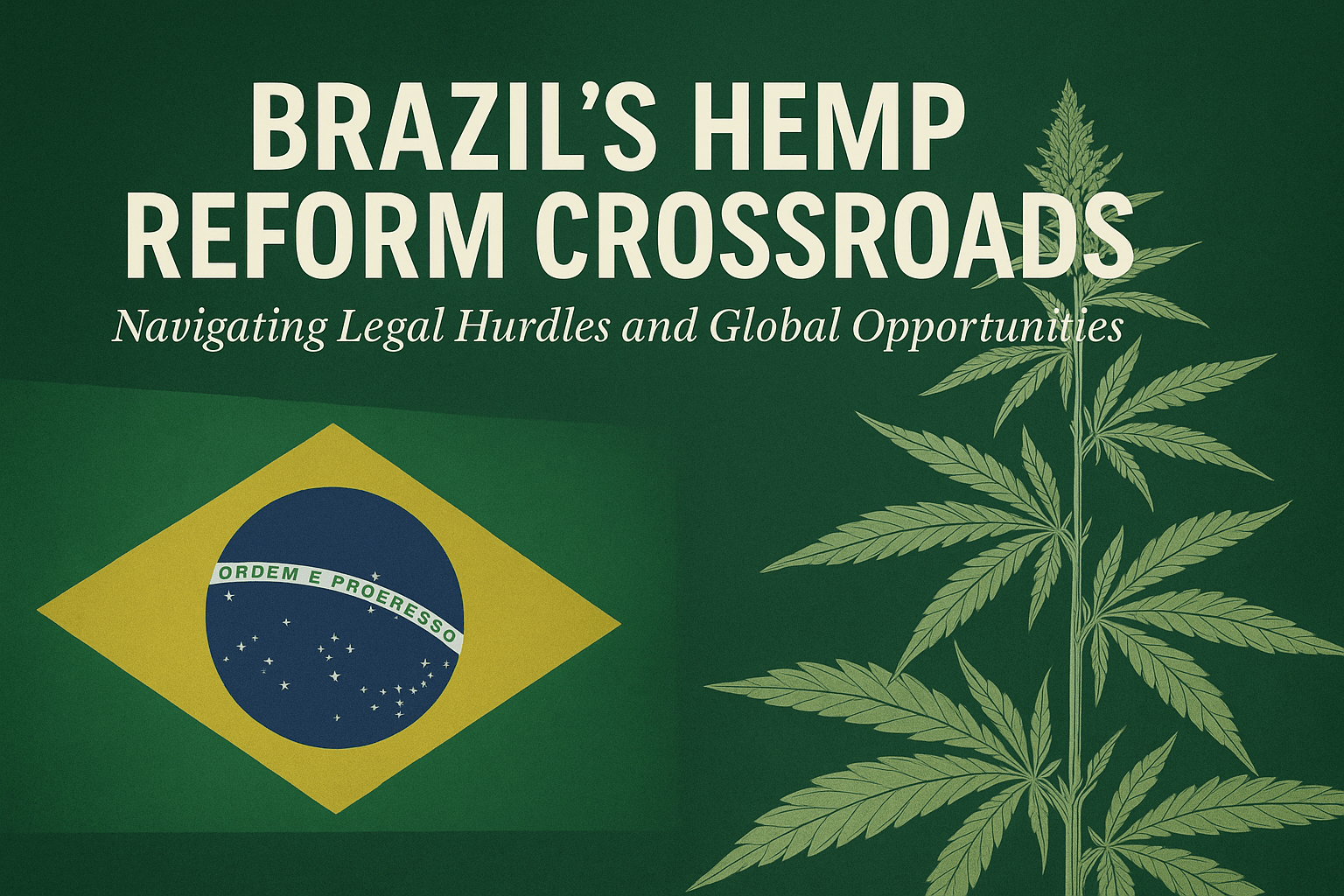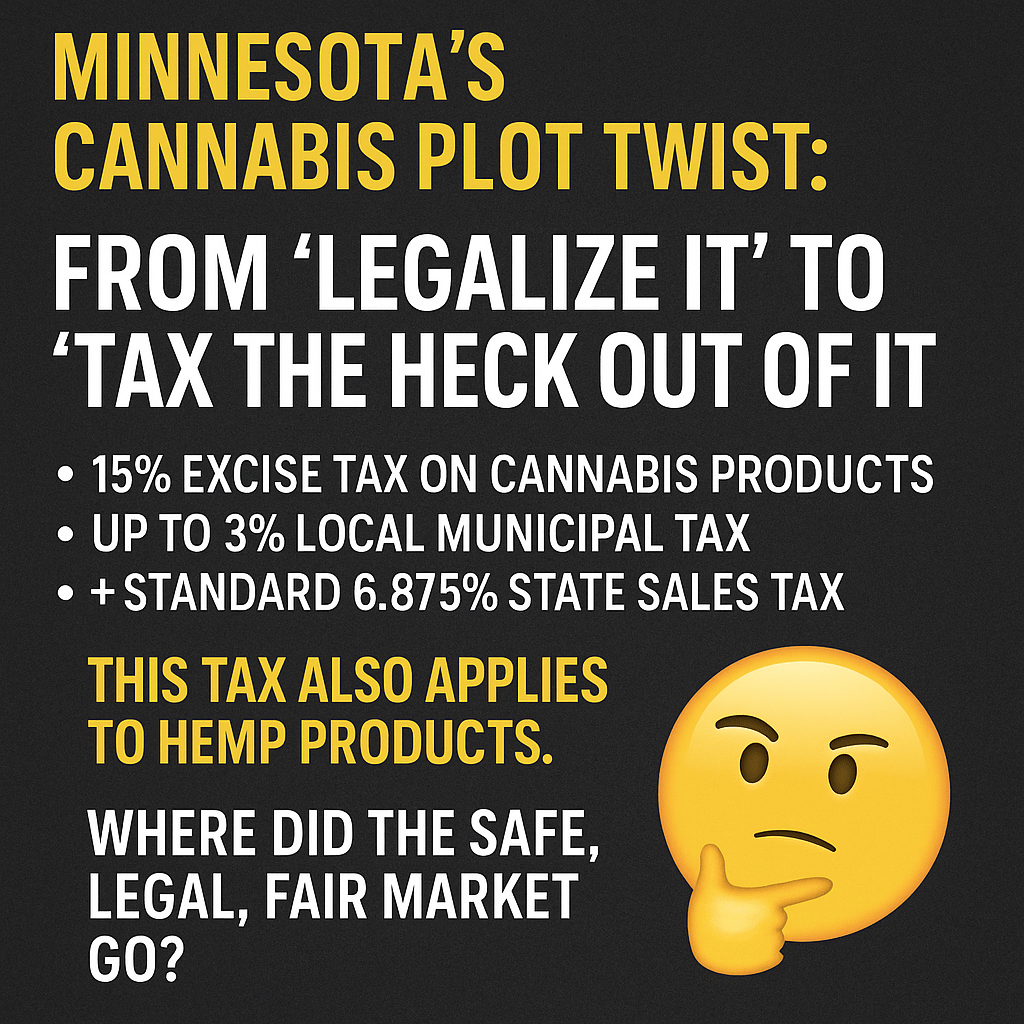This summary outlines the proposed amendments in Minnesota SF 2370 relating to the regulation of hemp-derived cannabinoid products and medical cannabis. Key areas include definitions, product standards, dosage limits, packaging requirements, licensing, and enforcement.
1. Definitions and Scope
-
The term "lower-potency hemp edible" now refers to any product intended to be eaten or consumed as a beverage that contains hemp-derived cannabinoids.
-
The legislation clarifies terms such as "Minnesota Tribal governments," "medical cannabis manufacturer," and "registry verification."
2. Product Dosage and Composition Limits
-
THC Limits:
-
Non-beverage edibles: Max 5mg THC per serving, 50mg THC per package.
-
Beverages: Max 10mg THC per container, max 2 servings.
-
-
Non-Intoxicating Cannabinoids (CBD, CBG, CBN, CBC):
-
Max 100mg per cannabinoid per serving.
-
Max 1,000mg of each cannabinoid per package for non-beverage edibles.
-
Max 200mg of each cannabinoid per container for beverage products.
-
All other cannabinoids: Max 0.5mg per serving unless otherwise authorized by the Office of Cannabis Management (OCM).
-
Max 100mg per cannabinoid per serving.
-
All other cannabinoids: Max 0.5mg per serving unless otherwise authorized by the Office of Cannabis Management (OCM).
-
3. Permitted and Prohibited Cannabinoids
-
Permitted: Delta-8 and Delta-9 THC from hemp, CBD, CBG, CBN, CBC.
-
Prohibited: THC-P, THC-O, HHC, and other synthetics unless authorized.
-
Artificially derived cannabinoids only allowed when created during delta-9 THC processing under strict ratio guidelines.
4. Manufacturing and Sales Regulations
-
All edible cannabinoid products must:
-
Be child-resistant, tamper-evident, and opaque (unless a beverage).
-
Avoid packaging that appeals to children or mimics existing food brands.
-
List serving size, total cannabinoid content, ingredients, allergens, and a child safety warning.
-
-
Retailers:
-
Cannot sell to individuals under 21.
-
Must store products behind the counter or in locked cases.
-
Can allow on-site consumption with strict controls (e.g., not mixed with alcohol).
-
5. Licensing Structure and Importation Rules
-
Licenses Required:
-
Manufacturer, Wholesaler, Retailer (for lower-potency hemp edibles).
-
-
Fee Structure:
-
Manufacturer: Application Fee $250 / Initial & Renewal: $1,000
-
Wholesaler: Application Fee $250 / Initial & Renewal: $10,000
-
Retailer: Application Fee $250 / Initial & Renewal: $250
-
-
Eligibility:
-
Entities may apply for and hold multiple hemp licenses simultaneously (e.g., wholesaler + retailer).
-
However, individuals or companies that hold a cannabis business license cannot hold a hemp license and vice versa, ensuring regulatory separation between cannabis and hemp operations.
-
🌐 Importation of Hemp-Derived Products into Minnesota
Minnesota SF 2370 allows for the importation of lower-potency hemp edibles into the state, but this is strictly regulated. Key requirements include:
-
Source Jurisdiction Requirements:
-
The manufacturer must be licensed in a state or tribal nation with substantially similar consumer protection laws.
-
Wholesalers must demonstrate that the out-of-state manufacturer adheres to practices aligned with Minnesota’s own standards for health, safety, and traceability.
-
-
Traceability and Documentation:
-
Imported products must come with detailed records that establish:
-
Origin of the hemp (farm, processing facility)
-
Cannabinoid content and lab test results
-
Compliance with THC and non-THC cannabinoid limits
-
Confirmation that no prohibited or synthetic cannabinoids (e.g., THC-O, THC-P, HHC) are included unless explicitly allowed
-
-
-
Retail and Distribution Compliance:
-
Products must be properly labeled and packaged in accordance with Minnesota law
-
All cannabinoid content per serving and per package must be clearly disclosed
-
Packaging must meet requirements for tamper-evidence, child resistance, and opacity (except for beverages)
-
-
Liability and Enforcement:
-
Wholesalers and retailers are fully liable for the compliance of imported products
-
Noncompliance may result in:
-
Civil penalties
-
Revocation or suspension of licenses
-
Criminal prosecution in cases of willful or fraudulent misrepresentation
-
-
These provisions aim to ensure that interstate hemp trade maintains the same consumer safety standards as in-state products, while also enabling economic participation across jurisdictions that align with Minnesota’s strict regulatory framework.
-
A license holder may apply for multiple license types. Cannabis license holders may not hold hemp licenses and vice versa.
-
Hemp Wholesalers may import hemp-derived cannabinoid products into Minnesota only if the source jurisdiction:
-
Has regulations that are substantially similar to Minnesota's.
-
Provides traceable supply chain documentation including origin, lab testing, and compliance.
-
-
Imported products must comply with labeling, safety, and dosage standards in Minnesota.
-
Retailers and wholesalers who import products are held liable for ensuring compliance and may be subject to penalties if noncompliant products are sold. Cannabis license holders may not hold hemp licenses and vice versa.
6. Medical Cannabis Program Updates
-
Clarifies definitions and responsibilities for healthcare practitioners, manufacturers, and the Office of Cannabis Management.
-
Updates registration, inspection, and reporting protocols.
-
Requires child safety and product labeling compliance.
7. Tribal and Cross-Jurisdiction Recognition
-
Establishes definitions and protections for tribal cannabis programs and patients.
-
Tribal medical cannabis boards are authorized to oversee compliance and enforcement.
8. Data Privacy and Law Enforcement
-
Strong protections for patient and registry data.
-
Restricts law enforcement access without a warrant.
-
Explicit protections for participants in the registry and tribal programs from criminal prosecution.
9. Marketing and Advertising Restrictions
-
Prohibits misleading medical claims and imagery in advertising.
-
Restricts use of cannabis symbols and cartoon characters.
10. Enforcement and Penalties
-
Heavy penalties for intentional diversion or violation of license terms.
-
$250,000 fine and revocation possible for trafficking cannabis out of state.
-
Criminal penalties for submitting false documentation.
This draft significantly modernizes and expands Minnesota’s regulatory framework for hemp and medical cannabis, with a clear focus on product safety, dosage control, and consumer transparency. It also introduces provisions that allow Minnesota companies to legally export cannabinoid products that may exceed in-state thresholds, so long as those products are lawful in the states to which they are shipped.
🗣️ Advocacy and Industry Engagement
Nothing But Hemp played an active role in advocacy efforts that helped shape key provisions of this legislation. We specifically pushed for:
-
Increasing the cannabinoid limit for non-psychoactive compounds like CBD, CBG, CBN, and CBC
-
Allowing licensed hemp businesses to participate in wholesale distribution and interstate importation of compliant products
-
Granting Minnesota hemp companies the ability to export cannabinoid products that are not legal within the state—as long as they comply with laws in the destination state. This empowers local producers to serve broader national markets and adapt to evolving regulations across jurisdictions.
These victories support a more open and economically viable hemp industry in Minnesota.
While the progress is encouraging, we remain cautious. The $10,000 annual license fee for wholesalers—to sell products that are federally legal—is a significant burden on small businesses and continues to raise concern.
That said, we’re pleased with how far the law has come, and we recognize that more changes may still be ahead. The legislative session isn't over yet, and we’ll continue to advocate for fair, sensible, and growth-oriented hemp regulations in Minnesota.
Disclaimer:
This document is provided for informational purposes only and does not constitute legal advice. While every effort has been made to ensure the accuracy of the information presented, readers should consult the official legislative text of Minnesota Senate File No. 2370 and seek legal or regulatory counsel for compliance and interpretation. The law may change, and this summary may not reflect the most current updates.








































